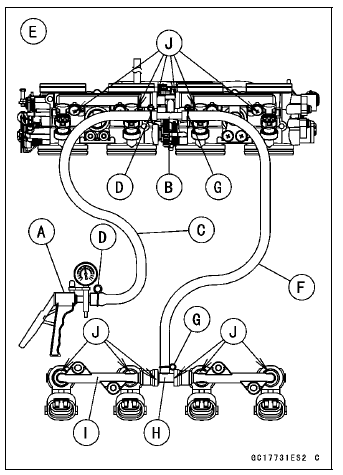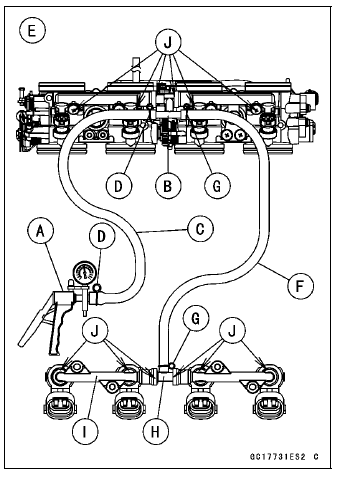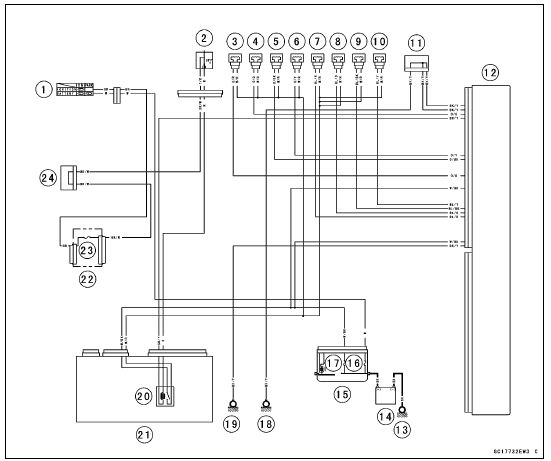


Do not remove the nozzle assy from the air cleaner housing.
Be sure to place a piece of cloth around the fuel outlet pipe of the fuel pump and the delivery pipe of the throttle body assy.
| WARNING Fuel is flammable and explosive under certain conditions and can cause severe burns. Be prepared for fuel spillage; any spilled fuel must be completely wiped up immediately. When the fuel hose is disconnected, fuel spills out from the hose and the pipe because of residual pressure. Cover the hose connection with a piece of clean cloth to prevent fuel spillage. |
Connect a commercially available vacuum/pressure pump [A] to the nipple of the delivery pipe [B] with the fuel hose [C] (both ends with the clamps [D]) as shown in the figure.
Rear View [E]

Apply soap and water solution to the areas [J] as shown in the figure.
Watching the pressure gauge, squeeze the pump lever, and build up the pressure until the pressure reaches the maximum pressure.
Injector Fuel Line Maximum Pressure Standard: 300 kPa (3.06 kgf/cm², 43 psi)
NOTICE
During pressure testing, do not exceed the maximum pressure for which the system is designed.
Watch the gauge for at least 6 seconds.
If the pressure holds steady, the fuel line is good.
If the pressure drops at once or if bubbles are found in the area, the fuel line is leaking. Replace the delivery pipe assy, injectors and related parts.
Install: Primary and Secondary Fuel Hoses (see Fuel Hose Replacement in the Periodic Maintenance chapter) Air Cleaner Housing (see Air Cleaner Housing Removal) Fuel Tank (see Fuel Tank Removal)
Start the engine and check for fuel leakage.
Fuel Injector Circuit

1. Ignition Switch
2. Engine Stop Switch
3. Secondary Fuel Injector #1
4. Secondary Fuel Injector #2
5. Secondary Fuel Injector #3
6. Secondary Fuel Injector #4
7. Primary Fuel Injector #1
8. Primary Fuel Injector #2
9. Primary Fuel Injector #3
10. Primary Fuel Injector #4
11. Joint Connector E
12. ECU
13. Engine Ground
14. Battery
15. Starter Relay
16. Main Fuse 30 A
17. ECU Fuse 15 A
18. Frame Ground 2
19. Frame Ground 1
20. Fuel Pump Relay
21. Relay Box
22. Fuse Box 1
23. Ignition Fuse 15 A
24. Joint Connector F
 Fuel Injector Output Voltage Inspection
Fuel Injector Output Voltage Inspection Throttle Grip and Cables
Throttle Grip and CablesPremuffler Chamber Installation
Replace the premuffler chamber gasket [A] with a new
one.
Install the premuffler chamber gasket to the premuffler
chamber [B] until it is bottomed so that the chamfer side
faces exhaust pipe [C].
Install the exhaust pipe clamp [D] as shown in the figure.
Insert the projection [E] into ...
Stick Coil Removal
Remove the air cleaner housing (see Air Cleaner Housing
Removal in the Fuel System (DFI) chapter).
Disconnect the stick coil connectors [A].
Pull out the stick coils [B] upward.
First, turn the stick coil by 90 degrees, and then pull it out
by twisting the coil head to the left and righ ...
Nozzle Assy Assembly
Before assembling, blow away dirt or dust from the delivery
pipes [A] by applying compressed air [B].
Replace the O-rings [A] of the joint pipe [B] with new ones.
Apply engine oil to the new O-rings, and insert it to the
delivery pipes [C]
Insert the joint pipe so that the step ...